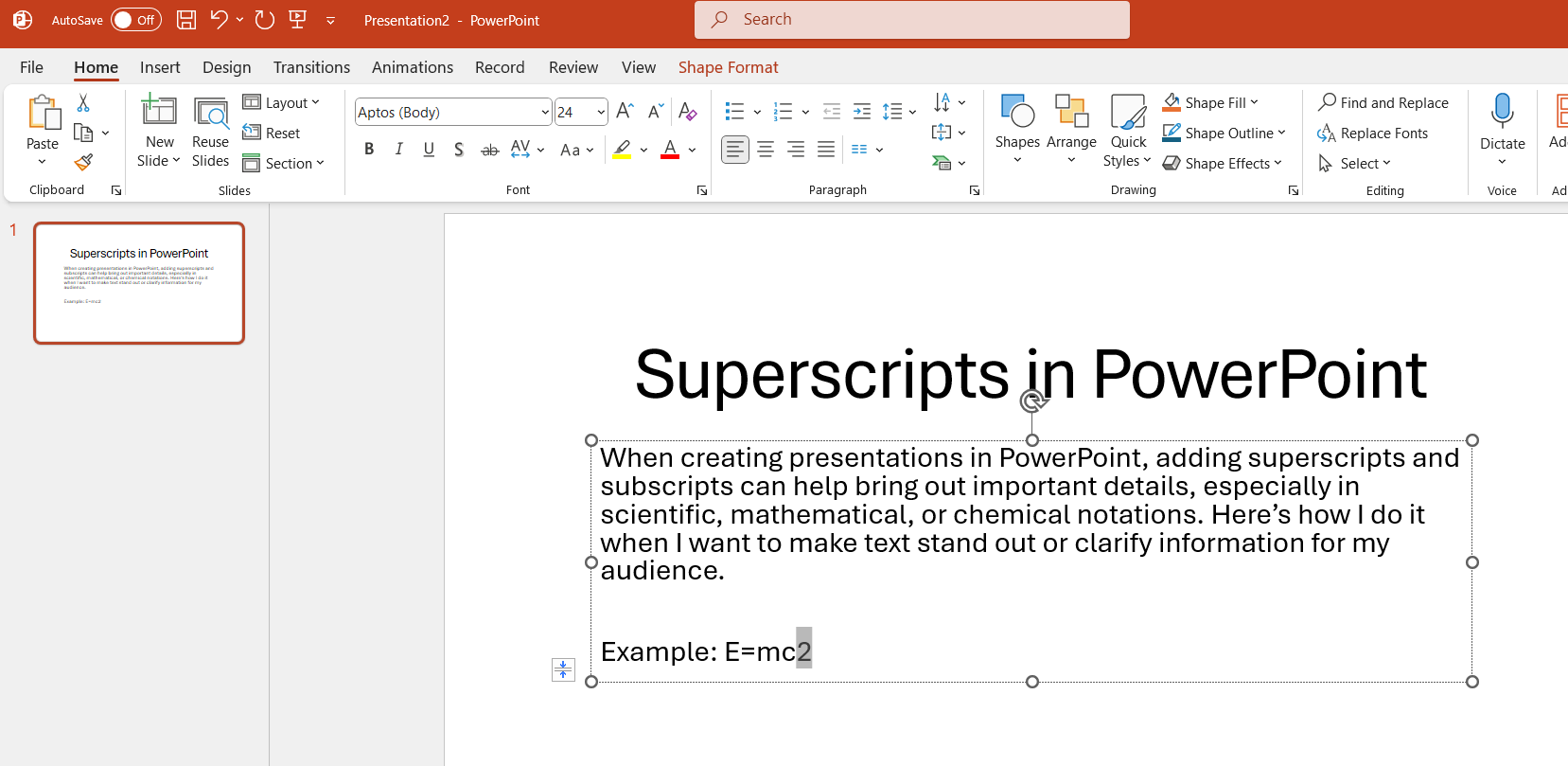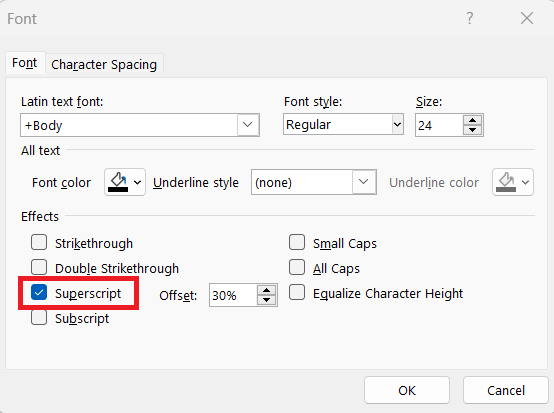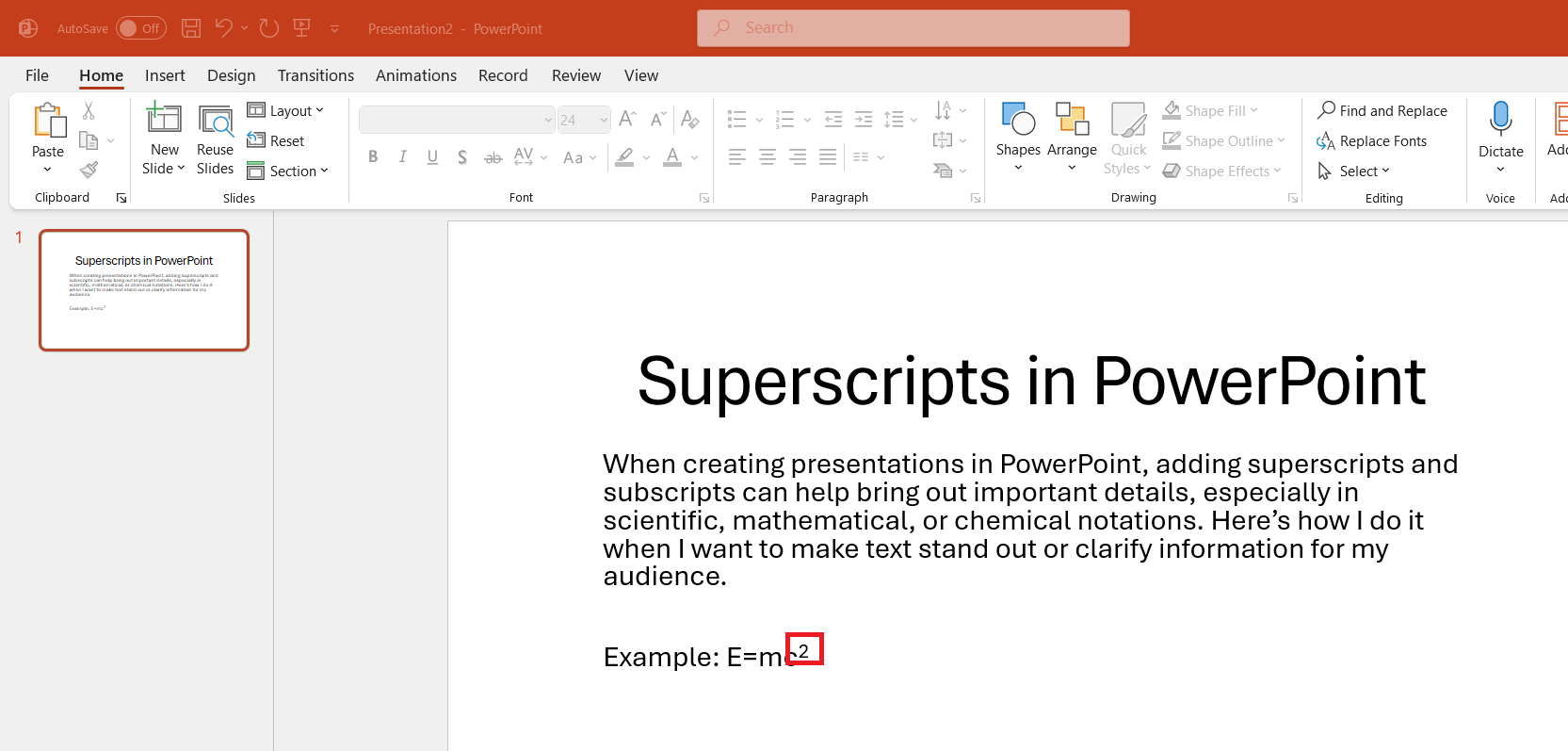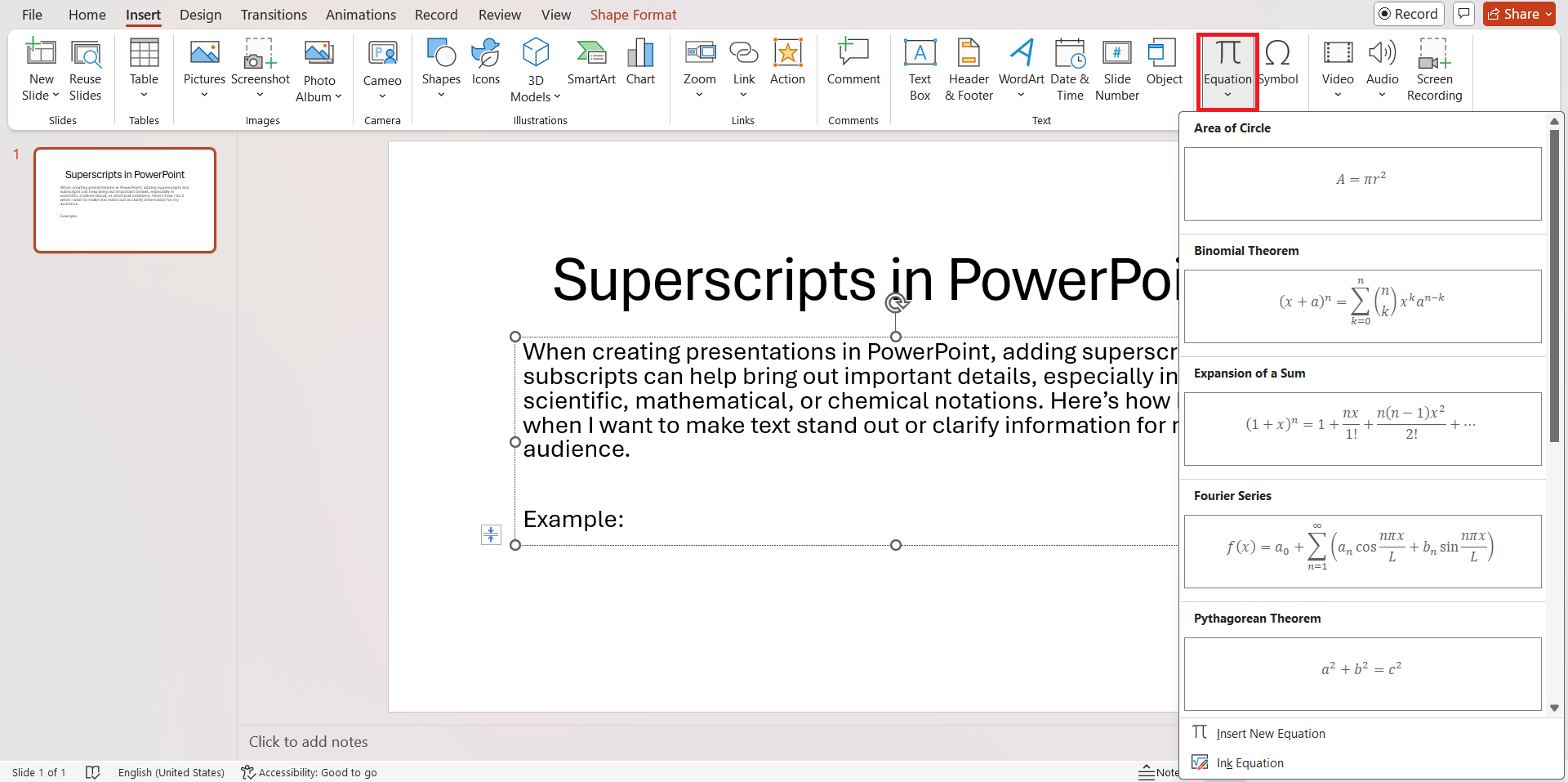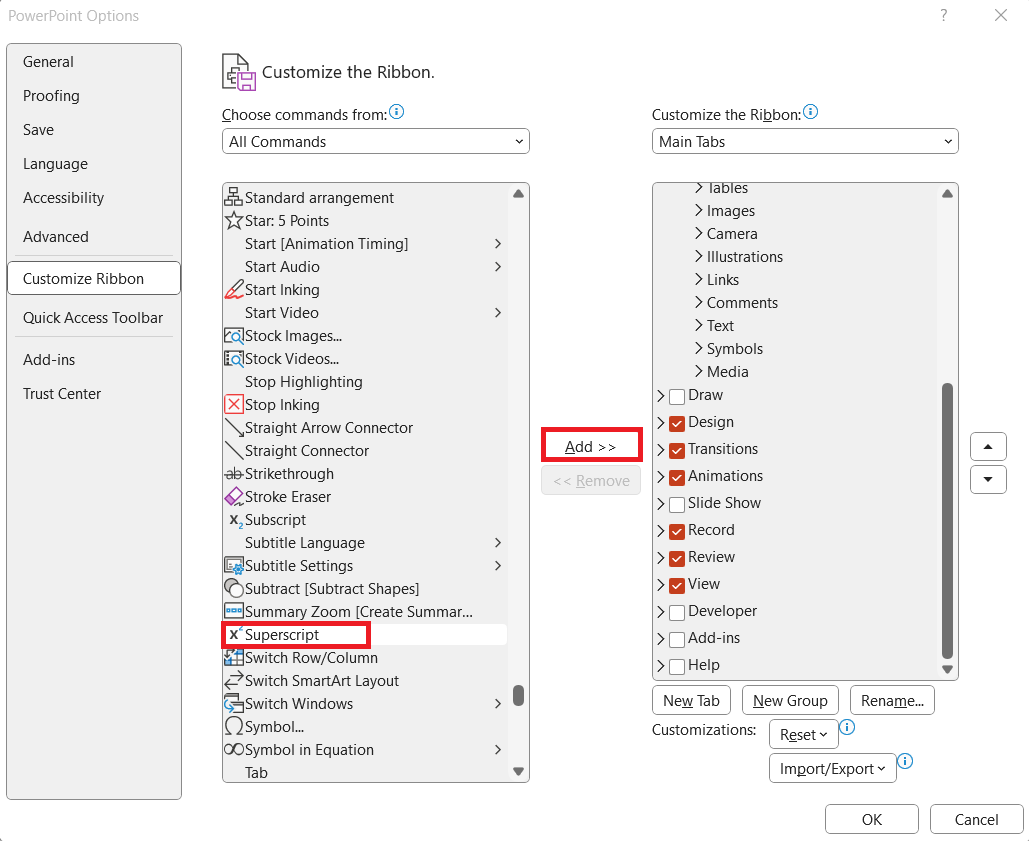When creating presentations in Microsoft PowerPoint, adding exponents or superscripts can help bring out important details, especially in scientific, mathematical, or chemical notations. Here’s how I do it when I want to make text stand out or clarify information for my audience.
Key Takeaways:
- Proper superscript formatting in PowerPoint enhances clarity, especially in scientific and mathematical presentations.
- Using the Font dialog box or keyboard shortcuts allows quick access to superscript and subscript formatting.
- Customizing the PowerPoint Ribbon can streamline frequently used tools, improving workflow efficiency.
- Keeping font size and alignment consistent across slides ensures legibility and professional presentation.
- Keyboard shortcuts, like Ctrl + Shift + (+) for superscript, save time and make last-minute edits simpler.
Table of Contents
Introduction: The Art of Superscript in PowerPoint
The Importance of Exponent Formatting in Presentations
When we talk about the power of a presentation, we don’t often consider the literal ‘exponents’ that can pack a punch into our slides. But here’s the thing: Proper exponent formatting is a game-changer. It’s essential for clear communication, especially in scientific, technical, or financial settings.
Incorrectly formatted exponents can lead to misunderstandings, frustration, and at worst, incorrect data interpretation. Ensuring clarity by using superscripts and subscripts in PowerPoint presentations highlights the fine details and supports the accuracy and professionalism I aim to project.
Overview of Superscript Techniques in PowerPoint
Getting to grips with superscript techniques in PowerPoint is like unlocking a new level of precision in my presentation. It allows me to effortlessly rise (quite literally) above the baseline and create a polished, scholarly look for text elements. PowerPoint creators have cleverly included both superscript and subscript options within their formatting arsenal, making it straightforward for me to add those tiny numerical powerhouses or chemical elements just where I need them.
Whether it’s showcasing an equation’s exponential power or typing trademark and copyright symbols, the advanced font and character options are my best friends here. They’re hidden under the Font menu—an arrow icon ready to unfold the magic of vertically adjusted text.
Getting Started with Adding Exponents in PowerPoint
Step-by-Step Guide to Accessing Superscript Options
To ease into the world of creating exponents in PowerPoint, let’s walk through the steps that I have discovered work best. Firstly, highlight the text segment that requires elevation or reduction, as the case may be.
After highlighting, I navigate to the Home tab – this is home base for many formatting controls. Then, I find the Font group and directly interact with the small arrow in the bottom-right corner, which will bring up the Font Dialog Box.
In this box, under the Effects section, lies the treasure trove: checkboxes for Superscript or Subscript. A simple click here, and another to confirm with ‘OK’, and the job’s done.
The highlighted text will be changed to superscript or subscript as per your selection.
Best of all, it’s possible to adjust several font attributes here at the same time—a real time-saver.
Keyboard Shortcuts: A Fast Track to Superscript Text
Mastering keyboard shortcuts has always been my secret weapon for speeding up my workflow, and when it comes to adding exponents in PowerPoint, there’s a neat shortcut that I find myself using all the time. To quickly convert text to superscript without having to navigate through menus, I select the text and hit Ctrl, Shift, and the Plus sign (+) together. Instantly, the selected text elevates, achieving that exalted superscript status.
Similarly, when I need text to take a humble stance below the line as a subscript, the combination of Ctrl and the Equal sign (=) does the trick.
These shortcuts are incredibly useful because they save time, which is of the essence when I’m refining a slide deck up until the last minute before a presentation.
The Versatility of Superscript Application
Infusing Power into Your Presentations with Superscript
Superscript isn’t just a typographical feature; it’s a way to infuse power and precision into presentations. I’ve seen firsthand how using superscript to display mathematical exponents correctly or to denote ordinal numbers instantly boosts the authority and credibility of the slides.
It’s remarkable how these small characters can make complex information accessible and understandable, such as in chemical formulas or mathematical calculations. Moreover, properly formatting trademarks and references with superscript honors the legal and scholarly standards, showcasing meticulous attention to detail that audiences undoubtedly appreciate.
Crafting Custom Equations with Ease in PowerPoint
Crafting custom equations in PowerPoint is something I approach with both excitement and anticipation. It’s a chance to break down complex concepts into simple, visually engaging elements. To do this, I head over to the ‘Insert’ tab and then click on ‘Equation’, which opens a world of mathematical structures I can adapt to fit my content.
From there, I can choose predefined commonly used equations or craft my own, inserting symbols and operators as needed.
What I find especially impressive here is how I’m able to enter exponents with such precision. This makes explaining intricate formulas less daunting, and adding exponents becomes a smooth part of the equation design process. The ease with which I can customize these equations ensures each presentation is not only informative but mathematically beautiful as well.
Advanced Superscript Tactics in PowerPoint
Navigating the Ribbon for Enhanced Superscript Features
When I want to take my presentations to the next level, customizing the Ribbon Menu in PowerPoint is my go-to strategy. Right-clicking on the Ribbon and selecting ‘Customize the Ribbon’.
It opens a world where the Superscript and Subscript buttons can be added to a custom group.
This approach is a game-changer, especially when my work involves frequent toggling between these formats. It’s not just about the visual effect; it’s about workflow efficiency. By tailoring the Ribbon to my specific needs, I save precious time, making my PowerPoint sessions significantly more productive.
Best Practices for Superscript Use
Keeping Clarity and Legibility at the Forefront
As I delve into creating my presentations, maintaining clarity and legibility in every slide is of utmost importance. The use of superscripts and subscripts allows for a compact, clear presentation of information, which is essential when dealing with scientific notations or mathematical equations.
However, it’s crucial to ensure that these smaller characters are still legible. I always use a larger font size for the main text so that the superscript remains clear when scaled down. Contrast is another key factor; a color that stands out from the background helps in preventing the superscript from blending in.
Consistent spacing around my exponents further enhances readability, making sure the audience can follow along without any strain or confusion.
Avoid Common Mistakes with Superscript Formatting
When we dive into the nitty-gritty of superscript formatting, I stay vigilant about the common pitfalls. One frequent blunder is the misalignment of the text. This happens when the superscript is either too high or too low relative to the base text.
Another is the inconsistency of formatting throughout the presentation, which can confuse the audience or detract from the overall professional look. Font size is another concern; exponents that are too small can be challenging to read, while those too large may overpower the base numbers.
My go-to best practice is to always proofread and double-check the consistency across all slides. I also tweak the baseline shift settings if the default superscript alignment does not meet my needs, ensuring each exponent fits seamlessly with its accompanying text.
FAQ: Answering Your Superscript Queries in PowerPoint
How do you easily insert a superscript in PowerPoint?
To insert a superscript in PowerPoint swiftly, I highlight the text I want to superscript and then press Ctrl, Shift, and the Plus sign (+). This shortcut transforms the selected text into a neatly formatted superscript without having to navigate through multiple menus, saving me a considerable amount of time.
How to do 2 squared on PowerPoint?
To represent ‘2 squared’ in PowerPoint, I first type the number 2 alongside the number I wish to square. I then highlight the second numeral and either use the Ctrl, Shift, and Plus sign (+) shortcut for superscript or access the Font Dialog Box from the Home tab to check the superscript option manually. Voilà, the number transforms into the power of 2.
Are there limitations to PowerPoint’s exponent handling capabilities?
Yes, while PowerPoint can handle basic exponent formatting with ease, it does have limitations when dealing with very complex mathematical notations or specialized formatting often required in higher-level scientific publications. For intricate calculations, using dedicated mathematical software or workaround solutions, like importing images of the correctly formatted notation, might be necessary to achieve precision.
Can standard keyboard shortcuts always be used for adding exponents in PowerPoint?
Standard keyboard shortcuts, such as Ctrl, Shift, and Plus sign (+) for superscript, are typically reliable for adding exponents in PowerPoint. However, they may not always work if there are software conflicts, custom keyboard settings, or technical glitches. It’s wise for me to familiarize myself with alternative methods via the ribbon or menus just in case these shortcuts are temporarily unavailable.
How do I insert superscript or subscript symbols quickly?
To quickly insert superscript or subscript symbols in PowerPoint, I select the text or number to modify and use keyboard shortcuts for speed. For superscript, I press Ctrl, Shift, and Plus sign (+) simultaneously. For subscript, Ctrl and the Equal sign (=) are the keys I press at the same time. These shortcuts are my go-to for rapid formatting without sifting through menus.
John Michaloudis is a former accountant and finance analyst at General Electric, a Microsoft MVP since 2020, an Amazon #1 bestselling author of 4 Microsoft Excel books and teacher of Microsoft Excel & Office over at his flagship MyExcelOnline Academy Online Course.

